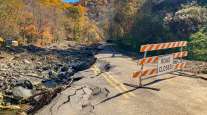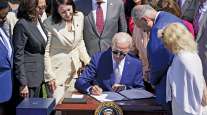Staff Reporter
Trump Urges States to Streamline Permits for Infrastructure Projects

President Donald Trump encouraged state and local government leaders to streamline their permitting processes for infrastructure projects.
Trump met with governors, mayors and members of his Cabinet at the White House Feb. 12 to discuss his $1.5 trillion infrastructure plan, released earlier that day. Streamlining the permitting process for infrastructure projects is a hallmark of the proposal.
RELATED: Iowa Tops ARTBA List of States With Deficient Bridges
It calls for $200 billion in direct federal funds to achieve the desired top line of $1.5 trillion in infrastructure investments over 10 years. Some $100 billion of that would be made available for an incentives program for states and local agencies, $50 billion would be allocated for rural projects through block grants, $20 billion would be dedicated for a “transformative projects program,” $20 billion would be used to enhance existing federal credit programs and broaden the use of private activity bonds and $10 billion would back the creation of a Capital Financing Fund.
Trump indicated it was up to states to expedite their own permitting processes.
“If you can’t get your permits and you can’t get them quickly, the money’s going to go to someone else,” Trump said.
Miami-Dade County Commissioner Esteban Bovo said environmental regulatory procedures are one of the biggest hindrances to completing projects quickly. The city is planning six rapid transit corridors in the city.
“The gridlock that we are experiencing could be one of biggest detractors to economic investment. That construction man, that plumber, that carpenter loses jobs because he can’t get to all five appointments,” Bovo said. “Many corridors [we’re] examining now have been studied since 1970. It seems to me the pyramids in Egypt were built faster than some of the projects that we’re contemplating.”
Environmental Protection Agency Administrator Scott Pruitt was one of the Cabinet members in attendance, along with Transportation Secretary Elaine Chao and Commerce Secretary Wilbur Ross.

Pruitt
Pruitt pledged to streamline the environmental permitting process, particularly for water infrastructure projects.
He said an expedited permitting process will “radically transform how we see investment.”
“By the end of 2018, we will process every permit, up or down, within six months,” he said.
Robert Loughery, chairman of the board of commissioners for Bucks County, Pa., described a bridge near his house that has been closed for seven years because the board has not been able to obtain a permit to work in a historic area. Bucks County, about 40 miles north of downtown Philadelphia, has 115 bridges.
The American Road and Transportation Builders Association published a report Jan. 29 revealing deficiencies in many bridges linking the highway system. The group, representing those in the transportation design and construction industry, has rated more than 54,000 of the nation’s 612,000 bridges “structurally deficient.”
Trump focused on that: “A high number of bridges are considered unsafe, and yet they’re being used. I don’t want to see tragedies,” he said. “They have to be fixed, or they’re going to go down. I like fixing rather than building new.”
Local governments also have sought funding for road work and port expansions to bolster their economies. For example, New Mexico Gov. Susana Martinez said infrastructure is a primary issue as her state sustains a booming energy industry. She said many two-lane highways require upgrades such as doubling capacity and turning lanes, and that New Mexico has financed road improvement projects with private, public and national funds.
Recently inaugurated Virginia Gov. Ralph Northam asked for the president’s help in improving the Port of Virginia in Newport News, which Trump said “could be one of the best ports in the world.” Northam said depth is a priority, and various channels in the port should be dredged to 55 feet.

Northam
“We are in a position to be the best port,” Northam said. “[It’s] all about exporting and keeping this economy going.”
Counties invest more than $122 billion in infrastructure and public works annually, according to the National Association of Counties. The association said Feb. 12 that counties build and maintain 46% of public road miles.
“Despite strict constraints on our ability to generate revenue and an ever-growing list of federal and state unfunded mandates, we invest significantly in infrastructure,” Executive Director Matthew Chase said. “To build upon our efforts, we need a reliable federal partner to invest in our communities and streamline processes that inhibit our efficiency.”




